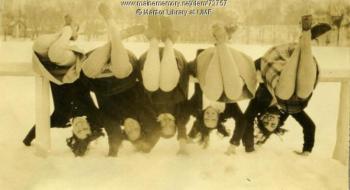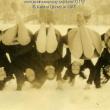What’s wrong with kids today? Their ‘foolish, indulgent parents’
 Young women at the Farmington State Normal School circa 1929. (Photo courtesy Maine Historical Society)
Young women at the Farmington State Normal School circa 1929. (Photo courtesy Maine Historical Society)
 Thomas Arkle Clark, Dean of Men at the University of Illinois. (Photo courtesy archives of Univeristy of Illinois)
Thomas Arkle Clark, Dean of Men at the University of Illinois. (Photo courtesy archives of Univeristy of Illinois)
 Young women at the Farmington State Normal School circa 1929. (Photo courtesy Maine Historical Society)
Young women at the Farmington State Normal School circa 1929. (Photo courtesy Maine Historical Society)
 Thomas Arkle Clark, Dean of Men at the University of Illinois. (Photo courtesy archives of Univeristy of Illinois)
Thomas Arkle Clark, Dean of Men at the University of Illinois. (Photo courtesy archives of Univeristy of Illinois)
In researching a project I’ve been working on lately, I found myself at the Rockland Public Library earlier this week, scanning through newspaper microfilm to see what events unfolded in the Midcoast in the spring of 1927.
Back then the Rockland-Courier Gazette came out three times a week and cost three cents a copy.
An essay titled What is the Matter With Our Young People? caught my eye. Written by Thomas Arkle Clark, Dean of Men at the University of Illinois, the essay was originally published inThe Rotarian magazine and republished by the Rockland-Courier Gazette in April.
It was a fascinating look at how a dean regarded the Flapper era, a time when young college men wore hip flasks to socials and young women were scandalously joining them, openly drinking in public during Prohibition. The Model T was only $400 back then and everyone was driving them.
What do I think of them? I am asked this question wherever I go. Are they going to the devil as fast as the general public suggests that they are? Are they wilder or less moral than we, their virtuous predecessors were? Are they breaking away from all hampering conventions and giving up all religious principles and ideas? In short what, if anything is wrong with them?
Clark’s “we walked up hill both ways when we were young ‘uns” platitude was clearly evident at the start of this essay. He explains what it was like for him as a young person under his father’s household rule:
There was no card-playing in his house; his children were not allowed to dance; and when Sunday came all secular matters were set aside... we had no telephones, no electric lights, no automobiles. There wasn’t a paved street in town. We studied by kerosene lamps in rooms heated with little soft-coal stoves, and if there was a bath tub in town excepting the one in Terbush’s barbershop where we paid twenty-five cents for the privilege of cleaning up, I never knew about it.
When Clark himself went to college, Prohibition had not yet been enacted.
There were fourteen saloons in the little town in which I went to college and they did a good business....There was far more drinking than there is now, as badly as prohibition is enforced. A friend of mine who is head of a big institution told me not long ago that he knew a half dozen bright young fellows who paid their way through college by means of their skill at poker.
Drinking, dancing, gambling, lassitude, and extravagance were only a few vices Clark observed were plaguing the moral fortitude of young people in 1927. But surprisingly, he also saw their point of view, as well. Using a young man he knew named Connor as an example, he said:
Connor has been brought up in the orthodox faith. He was taken to church until he was old enough to go of his own accord, and for a time, he questioned nothing, analyzed nothing, thought of nothing for himself. Now he is uncertain, he is asking questions, he is trying to discover why and why not. It is not that he is irreligious; he sincerely wants to be truly religious, but he is determined to think things out for himself...
The young person of today is more resourceful than any other young person whom I’ve known. He can do anything he wants to do and can do it better than any of his predecessors. Challenge him and he will meet your challenge with a success that is almost unbelievable....The chief difficulty is to get him to the point of wanting to do something.
Just when you think Clark was beginning to fall into a generational cliché with this essay, he flipped the script completely and put all of the shortcomings of young people squarely on the shoulders of their parents.
If there is anything in particular the matter with our young people, parents, more than anyone else and anything else, are responsible. Children respond to their training in an amazing manner; they take on habits very early, which dominate them throughout life. By the time they are twelve or fifteen the path they are going to follow has been pretty well marked out for them, and parents, and the home are largely responsible for this choice.
Clark goes on to cite example after example of parental indulgence. In one case, the father of one of his 19-year-old college students called Clark to ask permission to let his son use his “motor car” to get to and from college, rather than walk, because the son gets up late and it’s “rather hard for him to make his nine-o’clock class.”
In another case, he recalls a young woman, Clara, whose mother has already bought her three fur coats, yet Clara is unhappy with her latest because nobody “wants to wear a fur coat longer than one season.”
Then there was the parent who called Clark after her son, George, had been dismissed from the University of Illinois as a result of an arrest for public drunkenness.
“We have always had liquor in the house,” she explained, ”and George has been free to take it when he wished. We teach temperance in our family; I never dreamed that my boy would go to excess.”
The trouble, where there is trouble, is largely with the parents who coddle their children and make their lives too soft and easy. There are too many coonskin coats and flashy looking runabouts. There are too many extravagant allowances and too many parties where the young people who go to them should be playing children’s games or at home in bed.... In general, have found that from eighty to ninety percent of the young people with whom I have to do are conscientious and hard working and anxious to do well. It is the minority of ten percent who have stirred up comment and made themselves notorious by their irregularities and for these things, foolish, indulgent parents are largely responsible.
As they say, the more things change, the more they stay the same.
To see the article in full from The Rotarian in 1927, click here.
Related stories:
The mysterious speakeasys of Rockland, where history whispers old secrets
Absinthe, once illegal, making roaring comeback in Maine
Kay Stephens has been researching the Prohibition era in Midcoast Maine for a new project. She can be reached at news@penbaypilot.com
Event Date
Address
United States
























